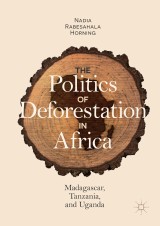Details

The Politics of Deforestation in Africa
Madagascar, Tanzania, and Uganda|
28,88 € |
|
| Verlag: | Palgrave Macmillan |
| Format: | |
| Veröffentl.: | 24.04.2018 |
| ISBN/EAN: | 9783319768281 |
| Sprache: | englisch |
Dieses eBook enthält ein Wasserzeichen.
Beschreibungen
<div>This book explores how environmental policies are made and enforced in Africa. Specifically, this project explains the gap between intent and impact of forest policies, focusing on three African societies facing persistent deforestation today: Madagascar, Tanzania, and Uganda. The central claim of the study is that deforestation persists because conservation policies and projects, which are largely underwritten by foreign donors, consistently ignore the fact that conservation is possible only under limited and specific conditions. To make the case, the author examines how decision-making power is negotiated and exercised where communities make environmental decisions daily (local level) and where environmental policies are negotiated and enacted (national level) across three distinct African political systems.</div>
1. Why Deforestation Persists in Africa: Actors, Interests, Institutions, and Interest Alignment<div><br></div><div>2. Seeing Like a Farmer: Resource Politics at the Community Level</div><div><br></div><div>3. Executive Branches and Trees: Environmental Politics at the National Level</div><div><br></div><div>4. Across the Great Divide: Collaborative Forest Management</div><div><br></div><div>5. Epilogue<br></div>
<b>Nadia Horning</b> is Associate Professor, Director of African Studies, and Faculty Director of Social Entrepreneurship at Middlebury College, USA.
<div>This book explores how environmental policies are made and enforced in Africa. Specifically, this project explains the gap between intent and impact of forest policies, focusing on three African societies facing persistent deforestation today: Madagascar, Tanzania, and Uganda. The central claim of the study is that deforestation persists because conservation policies and projects, which are largely underwritten by foreign donors, consistently ignore the fact that conservation is possible only under limited and specific conditions. To make the case, the author examines how decision-making power is negotiated and exercised where communities make environmental decisions daily (local level) and where environmental policies are negotiated and enacted (national level) across three distinct African political systems.</div><div><br></div><div><b>Nadia Rabesahala Horning</b> is Associate Professor, Director of African Studies, and Faculty Director of Social Entrepreneurship at Middlebury College, USA.</div><div><br></div>
<p>Explores how environmental policies are made and enforced in Africa</p><p>Explains the gap between intent and impact of forest policies in Madagascar, Tanzania, and Uganda</p><p>Brings to light the often overlooked perspectives of African farmers who are affected by environmental policies</p>
<div>Explores how environmental policies are made and enforced in Africa.</div><div><br></div><div>Explains the gap between intent and impact of forest policies in Madagascar, Tanzania, and Uganda.<br></div><div><br></div>Brings to light the often overlooked perspectives of African farmers who are affected by environmental policies.
“Professor Horning’s book is an invaluable contribution to the world’s knowledge about conservation. I found it truly enlightening and encourage all African leaders, conservationists, and international donors to read it in order to craft and implement more effective conservation policies.” (Fred Swaniker, Founder, African Leadership University, Mauritius & Rwanda)<p>“Horning’s argument that the simultaneous alignment of local, national and international actors’ interests makes forest conservation most likely is compelling. Her thesis is applicable to other areas of Africa and beyond the continent. Her work shows how Africans can utilize their own governance mechanisms to resolve environmental issues in Africa, as well as pose paradigms applicable to non-African contexts. This is the essence of the value of comparative political science work.” (Errol Henderson, Associate Professor, Penn State University, USA)<br></p>
<p>“Horning challenges the notion that there is a symbiotic relationship between farmers and executives/donors, yet she persuasively argues that it is at the nexus of this relationship that efficacious policy can be made. The book is a manual for policy-makers and an invaluable resource for students and scholars alike.” (Joshua Rubongoya, Professor, Roanoke College, USA)<br></p>
<p>“Horning challenges the notion that there is a symbiotic relationship between farmers and executives/donors, yet she persuasively argues that it is at the nexus of this relationship that efficacious policy can be made. The book is a manual for policy-makers and an invaluable resource for students and scholars alike.” (Joshua Rubongoya, Professor, Roanoke College, USA)<br></p>

















